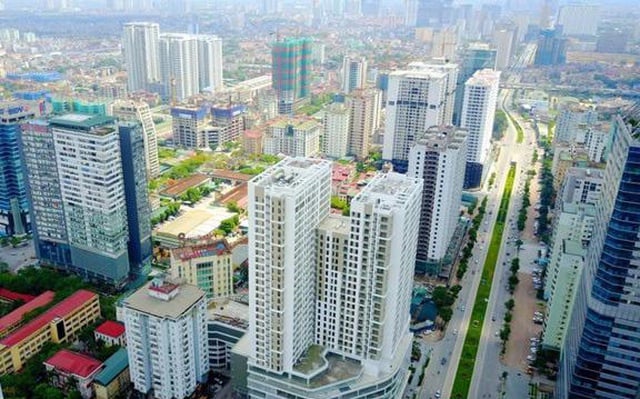House prices far exceed incomes
According to the report of the Vietnam Association of Realtors (VARs), housing prices, especially apartment products, have continuously increased and established a new price level at a high threshold.
Over the past five years, apartment prices in Hanoi, Ho Chi Minh City and Da Nang have grown by 72.4%, 49.9% and 34.3% respectively, while the average income of people has only increased by about 6-10% per year and is at a very low level.
Over the past five years, apartment prices in Hanoi, Ho Chi Minh City and Da Nang have grown by 72.4%, 49.9% and 34.3% respectively. (Photo: STO)
This forces young workers to rent houses because they cannot afford to buy a house and find it difficult to meet such large long-term loans.
Specifically, with current housing prices, 2-bedroom apartments priced under 3 billion have almost "disappeared". Even if they have available finance equivalent to about 30% of the apartment value and choose to borrow to buy the remaining house, equivalent to about more than 2 billion VND, borrowing to buy a house for young people still faces "countless difficulties".
Choosing to take out a home loan means having to pay off the debt in 15-25 years, or having to “tighten your belt” and cut back on other expenses to have a shorter repayment period. This means affecting the quality of life.
Floating interest rates are difficult to "predict" and also make many young people afraid to borrow money to buy a house.
In addition to financial issues, the mindset of home ownership is also gradually changing, especially among the younger generation. Instead of "struggling" with debt to own an apartment, many people accept renting to have a more flexible life.
Accordingly, the younger generation, especially Gen Z (those born from the end of 1997), has a flexible lifestyle with a tendency to experience and explore. They are more likely to decide to change their place of residence and workplace than previous generations.
Renting a house helps them move around easily without being tied down by fixed assets. Even the group of young people with top incomes, who own many properties, are still willing to rent high-end serviced apartments, priced up to thousands of USD per month to enjoy convenient and classy services.
Vietnam still has no policy to protect tenants.
Although the demand for rental housing is increasing, the rental market in Vietnam is still limited and has not really become a complete alternative to home ownership.
Because currently, most of the rental housing supply in Vietnam is owned and managed by individuals, without the participation of professional investors.
VARs believe that Vietnam still lacks a policy to protect tenants. Most leases in Vietnam are short-term (6-12 months) and do not have binding conditions and increases, putting tenants at risk of instability and benefits.
At the same time, although the monthly payment is lower than choosing to borrow to buy a house, the rental cost in Ho Chi Minh City and Hanoi is still quite high.
A 2-bedroom apartment in the center of Ho Chi Minh City has a rent ranging from 12-20 million VND/month, equivalent to 30-50% of the income of many workers, which means that tenants have to cut down on other needs according to the principle that housing costs do not exceed 30% of income.
Meanwhile, apartments with lower rents are mainly in suburban areas far from the city center, where public transport infrastructure is underdeveloped, making tenants "afraid".
Mr. Nguyen Van Dinh, Chairman of VARs, said: Choosing to rent a house instead of buying helps young people maintain a flexible lifestyle and reduce financial pressure in the short term. However, to ensure quality of life and economic efficiency, young people need to consider carefully to ensure that it is suitable for their finances and living needs.
Accordingly, to avoid prolonged financial pressure, rental costs should be controlled at no more than 30% of income. In addition to price, it is necessary to prioritize convenient locations for work and living, and at the same time choose reputable landlords, with clear contracts on rental time and price. Along with checking the quality of housing, security and management services for apartment products.
In the long term, Mr. Dinh believes that the trend of renting instead of buying will continue to grow along with many new rental models that are gradually becoming popular in the world, such as long-term rental with ownership.
Tenants pay monthly and after a certain period of time (5-10 years), they can buy the house back at a fixed price or have a portion of the rent deducted from the purchase price.
Or with the shared ownership model, the buyer only needs to pay 30-50% of the apartment value in advance, the rest can be rented and has the right to buy more % of ownership over time.
However, renting can only become a popular option when the rental market is more professionally developed and supported by financial policies.
For example, if real estate businesses participate in developing "build to rent" models or legal policies have mechanisms to protect tenants' rights, limit annual rent increases and encourage long-term leases.
Viet Vu
Source: https://www.congluan.vn/viet-nam-van-chua-co-chinh-sach-bao-ve-nguoi-thue-nha-post341516.html



![[Photo] Overcoming all difficulties, speeding up construction progress of Hoa Binh Hydropower Plant Expansion Project](https://vstatic.vietnam.vn/vietnam/resource/IMAGE/2025/4/12/bff04b551e98484c84d74c8faa3526e0)
![[Photo] Closing of the 11th Conference of the 13th Central Committee of the Communist Party of Vietnam](https://vstatic.vietnam.vn/vietnam/resource/IMAGE/2025/4/12/114b57fe6e9b4814a5ddfacf6dfe5b7f)




















































































Comment (0)